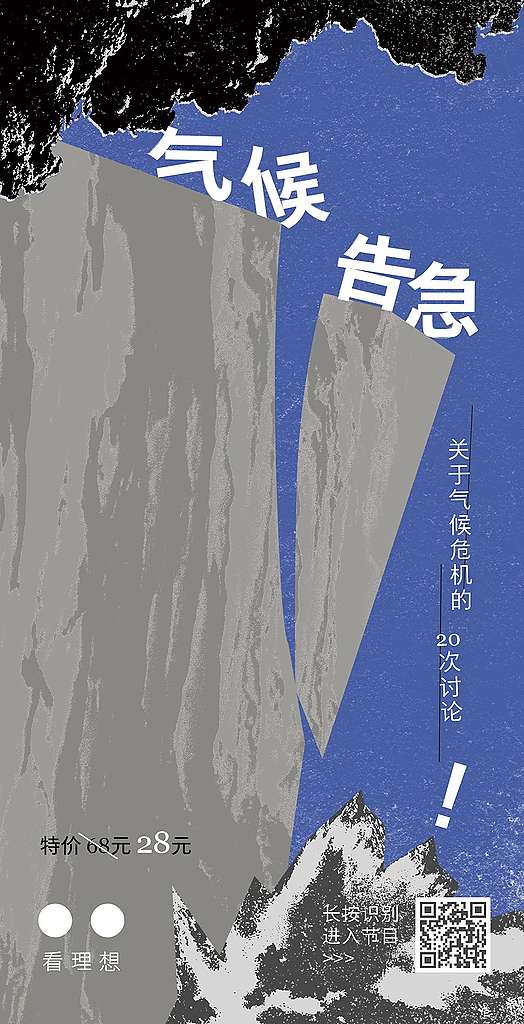“That numbness isn’t so much about information overload as much as a sense of powerlessness to take action.”

Climate disasters increasingly fill the news in China, often starting in spring with increasingly frequent sandstorms and moving into summer with extreme heat and flooding. The impact of climate change is everywhere in China, and awareness about the systematic nature of this crisis is growing every day.
But what can we do? It’s not an easy question for most people to answer with confidence.
Vistopia is a podcast (Chinese name 看理想) that produced a series of episodes called “Climate Emergency! 20 Discussions on the Climate Crisis” last year, exploring how the climate crisis impacts people.

Over 20 discussions, the program interviewed over a dozen experts in economy, history, architecture, environmental science, energy, food, geopolitics, social impact, biodiversity, and more.
This is a short interview between Vistopia producer Dany and Greenpeace East Asia climate and energy project campaigner Yang Xinran, with some edits for brevity and clarity.
Yang Xinran: Why did you want to start a program on climate change?
Dany: I first started paying attention to climate change and thought about doing a Vistopia episode on it after reading “This Changes Everything: Capitalism v. The Climate”.
This book’s sales [in China] were not great. Everyone jokes that climate change is “box office poison.” Everyone is struggling to buy a house, get through school, work – these kinds of concerns – how can anyone spend their time finding out more about a topic as complicated and hard to grasp as climate change?
So my first pitch for a podcast on this didn’t get picked up. Then, after Greenpeace provided more comprehensive topic coverage and support from topic experts, it became a topic the podcast decided to move forward with together.
Yang: In planning the podcast, what was the thought process about what topics to go into look like?
Dany: The content needs to be more grounded. A lot of climate change discussions are put in a very professional perspective like weather and technology, and it’s hard for the public to establish a relationship with climate change.
As a popular science program, even if it’s about the economy and energy, we choose entry points that are closely related to daily life, like unemployment, electricity, food, medical care, etc.
We hope that listeners can learn from different perspectives. We want listeners to feel that climate change is really affecting “my” life from different perspectives, rather than “it’s affecting many people’s lives, but it’s not happening to me.”
Yang: While recording the podcast in 2022, there were some extreme weather events like heatwaves and the forest fires around Chongqing. So besides Vistopia, there were a few other popular science articles and podcasts looking at this topic. Did you worry that people would become numb to the topic after hearing so much about it?
Dany: That numbness isn’t so much about information overload as much as a sense of powerlessness to take action.
If you want to maintain a passion for climate issues, then the conversation after every new bit of information is how to get involved in the process of responding to climate change, and how to take action. But, when asking “What can I do?”, there’s really no standard answer, no scientific result to show yourself. So when there is a lot of information about the climate emergency, and you can’t easily find the answer to what you can do, numbness sets in.
Doing communications on climate change is like planting a seed. And harvesting the product just isn’t going to look like countless impassioned listeners who are always enthusiastic about the topic. Rather, the product is getting more people to consciously edit climate change into their personal decision-making systems.
For example, after learning a lot about climate change, I begin to understand what it means for my life in the here and now. And I start to think, how can I build links between this and my life. This kind of awareness is even more important. There’s a level of paying attention and thinking that is no longer about sentimentality, but rather that as I understand the underlying factors at play, I understand what this whole thing actually means. Consciously making climate change a factor in my decision making is to me a form of taking action, and it’s what communicating about climate change is all about.
Yang: Has anything surprised you doing the podcast?
Dany: Recording our episode on climate change and health. It’s really not just another research area intersection to cover and then check off the list. I’m actually shocked our healthcare system are barely prepared at all to respond to climate change, and we haven’t all started anticipating what the worst case scenario here could be. This gap we identified really shows an example of the challenges in cross-issue discussion and interdepartmental cooperation on climate change. These challengers were re-confirmed in the episode of disaster relief. Doing disaster relief requires understanding meteorology, water conservancy, and disaster relief, but at present all of these fields are extremely isolated from one another. That’s a barrier to interdepartmental, interdisciplinary communication and knowledge sharing.
Yang: Have you ever gotten any interesting listener comments?
Dany: A lot of listeners believe that they’re in the like 1% of people who won’t be impacted by climate change, and that was pretty interesting. Most listeners do agree that climate change is really happening, but often don’t agree that human behavior is what drives it forward. People view the scientific community’s 99% certainty about climate change as meaning that it isn’t a certain thing yet, so there’s no need for immediate action. Wishful thinking about climate change is perhaps a widespread phenomenon, but it is a big challenge in climate action. I look forward to hearing more discussion from a psychological angle on analysis and solutions.
To get in touch, email [email protected].
